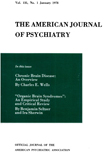Identification and Treatment of Acute Psychotic States Secondary to the Usage of Over-the-Counter Sleeping Preparations
Abstract
Within eight months, 36 patients seen at the Washington Hospital Center, Washington, D.C., presented the problem of differentiating between a toxic psychosis caused by ingestion of over-the-counter sleeping medications containing scopolamine and a schizophrenic episode. Clinical evaluations, case histories, and thin-layer chromatography were used to identify these patients. Urinalysis revealed the presence of at least two ingredients of over-the-counter sleeping medications in ten patients. Intramuscular injections of physostigmine salicylate reversed the toxic psychosis presumed to be the result of the scopolamine content in these preparations.
Access content
To read the fulltext, please use one of the options below to sign in or purchase access.- Personal login
- Institutional Login
- Sign in via OpenAthens
- Register for access
-
Please login/register if you wish to pair your device and check access availability.
Not a subscriber?
PsychiatryOnline subscription options offer access to the DSM-5 library, books, journals, CME, and patient resources. This all-in-one virtual library provides psychiatrists and mental health professionals with key resources for diagnosis, treatment, research, and professional development.
Need more help? PsychiatryOnline Customer Service may be reached by emailing [email protected] or by calling 800-368-5777 (in the U.S.) or 703-907-7322 (outside the U.S.).



